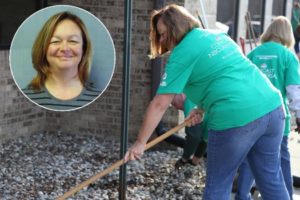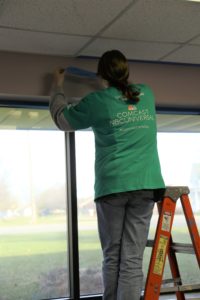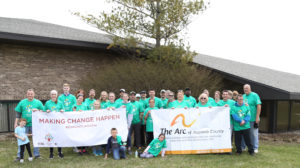Creating Healthy Habits With The Arc of Kentucky, The Arc of Central Kentucky
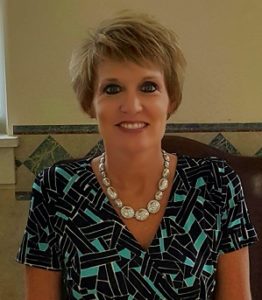 Throughout 2017, The Arc of Kentucky and The Arc of Central Kentucky participated jointly in The Arc’s Health and Fitness for All program. Health and Fitness for All addresses increased obesity propensity in the disability community by teaching healthy eating, portion control, and physical activity and helping individuals with IDD adopt healthy habits and lead healthier lives. Sherri Brothers chatted with us about the chapter’s work, the importance of teaching healthy habits, and how other chapters can do the same.
Throughout 2017, The Arc of Kentucky and The Arc of Central Kentucky participated jointly in The Arc’s Health and Fitness for All program. Health and Fitness for All addresses increased obesity propensity in the disability community by teaching healthy eating, portion control, and physical activity and helping individuals with IDD adopt healthy habits and lead healthier lives. Sherri Brothers chatted with us about the chapter’s work, the importance of teaching healthy habits, and how other chapters can do the same.
Tell us about your chapter’s Health and Fitness for All efforts. How did you hear about the program? How are you tailoring the program to your chapter and participants?
Health & Fitness was created in Kentucky because of the obesity rates, sedentary lifestyles, and unhealthy eating habits. Some of our individuals were not well- educated in nutrition facts or the options of exercise. The Arc of Kentucky heard about the program through The Arc of United States. We created an individualized program for each person. One young man with autism in our program loved writing but had no interest in exercise at all. A psychologist used the young man’s interest in writing to facilitate a relationship with others who loved writing. We created a program where he would start working out on a stationary bike while at the same time sharing his stories with his peers and the psychologist. He now enjoys exercising and looks forward to class each week.
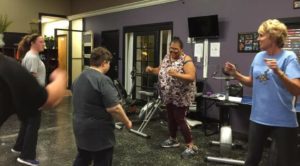
Why do you think it’s important for people with disabilities to learn about living a healthy lifestyle?
Chronic ill health can diminish an individual’s enjoyment in and ability to engage in all that life has to offer. By providing people with IDD an opportunity to make informed decisions about their health by educating them on the value of proper nutrition and exercise and the impact it can have on how they feel physically and emotionally, we are giving them the tools to own their well-being. That is the key to success.
Was the program successful? How so?
Yes! We have seen so many positive outcomes in the time we’ve been running the program: program weight loss – 168 pounds; lowered blood pressures, regular participation in exercise programs; participants learning how to shop and making healthier food selections; learning how to prepare healthier meals; and improved self-esteems and friendships made. At our three-month post-training check in, Annie has lost an additional 38 pounds and wants more information about healthy diets. Josh is watching his diet and is using less salt. Shaud is drinking more water and changed to drinking diet soda over sugary drinks. Nyketta has joined the YMCA to be able to continue her exercise.
Are you planning on expanding the program past the conclusion of the 12-week training? How so?
We passed the 12-week program and are planning to offer an additional four weeks of fitness classes in the fall and four weeks of cooking classes. We are also starting The Health & Fitness for All in other local chapters around the state. I am visiting with them, providing materials to them, and replicating the program which was very successful in our chapters — although encouraging them to tailor the program to their individuals’ needs. This just gives them a starting point – some helpful materials, ideas to start creating field trips, speakers, activities, games, etc.
What advice do you have for other chapters looking to implement health and lifestyle programs to enrich the lives of their constituents?
My advice is to look at the program as an enjoyable lifestyle change for the individuals. Think of it as creating a fun atmosphere for them to create the class, participate as the leaders in the class and the games. For instance, you teach a dance class, and then have each participant lead their favorite dance routine.
Tell us about all the great things your chapter is doing! If you’re interested in being spotlighted, please email Pam Katz at katz@thearc.org.


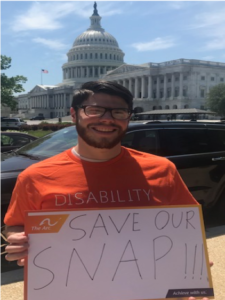 As my Paul Marchand Policy Internship at The Arc’s national office in Washington, DC comes to a close, I want to reflect on the importance of advocacy.
As my Paul Marchand Policy Internship at The Arc’s national office in Washington, DC comes to a close, I want to reflect on the importance of advocacy.